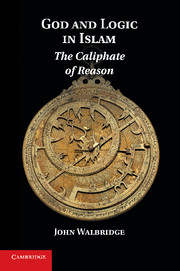Book contents
- Frontmatter
- Contents
- Illustrations
- Preface and Acknowledgements
- Spelling, Names, and Sources
- Introduction
- PART ONE THE FORMATION OF THE ISLAMIC TRADITION OF REASON
- PART TWO LOGIC, EDUCATION, AND DOUBT
- 6 Where Is Islamic Logic? The Triumph of Scholastic Rationalism in Islamic Education
- 7 The Long Afternoon of Islamic Logic
- 8 The Institutionalization of Disagreement
- PART THREE THE FALL AND THE FUTURE OF ISLAMIC RATIONALISM
- Selected Bibliography
- Index
8 - The Institutionalization of Disagreement
Published online by Cambridge University Press: 01 March 2011
- Frontmatter
- Contents
- Illustrations
- Preface and Acknowledgements
- Spelling, Names, and Sources
- Introduction
- PART ONE THE FORMATION OF THE ISLAMIC TRADITION OF REASON
- PART TWO LOGIC, EDUCATION, AND DOUBT
- 6 Where Is Islamic Logic? The Triumph of Scholastic Rationalism in Islamic Education
- 7 The Long Afternoon of Islamic Logic
- 8 The Institutionalization of Disagreement
- PART THREE THE FALL AND THE FUTURE OF ISLAMIC RATIONALISM
- Selected Bibliography
- Index
Summary
Asking questions and disagreeing about their answers is at the heart of the Islamic experience. The first believers – and, equally important, the first unbelievers – came to the Prophet with questions. A significant portion of the Qur'ān and an even larger portion of the hadith consist of answers to those questions. After the Prophet's death, the believers came with their questions to those who had known the Prophet. Later they came to those who knew the stories passed down from the first generation of believers or who were the bearers of the accumulated religious wisdom of the Islamic community. And still they come with their questions to those who are reputed to have knowledge. But the answers they are given are not always the same. And therein lies one of the puzzles and achievements of medieval Islamic civilization.
three phenomena – each in its way relating to the role of disagreement in Islamic society, have puzzled me. Each relates to the same underlying feature of the Islamic religion in its premodern expression: a willingness to institutionalize permanent disagreement.
1) Why did Muslim scholars endorse diversity in matters that would seem to have only one right answer: legal schools, texts of the Qur'ān authoritative collections of hadith, and the like?
2) Why did Muslims adopt a curriculum for training clergy that stressed form over content, an educational method that stressed interpretive methods that only a handful of scholars would actually have practical use for?
3) Why is it that Muslims were successful in generating a consensus about the relation of religion and society in the Middle Ages but have been unsuccessful in doing so in modern times?
- Type
- Chapter
- Information
- God and Logic in IslamThe Caliphate of Reason, pp. 142 - 154Publisher: Cambridge University PressPrint publication year: 2010



